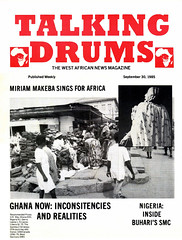Ghana and Nigeria: the World Cup jinx
by Kofi Andoh
The headaches of two West African sporting countries are discussed in this article.The elimination of Ghana and Nigeria from the final qualifying matches for the 1986 World Cup adds painful salt to the injuries of two nations still reeling from the shock of their exits from the prestigious 1986 version of the Africa Cup of Nations competition.
Two losses in a row - in both the World Cup and the Africa Cup qualifying series - marked the end of the two nations' attempt to reassert themselves in continental soccer and break the jinx facing West African teams in their bid to play in the World Cup.
To Ghana particularly, the current reverses in its soccer fortunes brings to a close a year when it experienced an unprecedented drought in soccer. Except the Africa Cup Winners Cup competition in which Kumasi Asante Kotoko still keeps the nation's flag flying, Ghana has been eliminated from all the major competitions on the continent. Nigeria's elimination comes at a time when its junior national teams are riding high on the crest of success and achievement.
On the whole, the elimination of the two countries exposed the level to which soccer in the sub-region has fallen and confirmed the emergence of North African teams as strong contenders for the leading spot in African soccer. Furthermore, it laid bare the inadequacies and shortcomings of foot- ball administration and development in the West African sub-region and beamed the danger signal of the region's march towards soccer oblivion.
In the World Cup qualifying series itself, West Africa's march towards qualification has always followed a disaster-prone pattern: after scaling the initial hurdles, West African teams cave in completely when matched against their North African opponents. The experiences of Nigeria and Guinea support this view.
But it is one huge paradox that of the few national sides which have managed to arrive and stay in the big leagues, West African teams, particularly Ghana and Nigeria, rank among the best. Ghana particularly has an enviable reputation - four times winners of the Africa Cun and the Africa Zone Supreme Council for Sports in Africa cup. The noble achievements of Nigeria's junior national teams, the triumph of the country in the 1973 All- Africa Games and in the 1980 Africa Cup and the successes of such club sides like Bendel Insurance, Rangers International, Stationery Stores and IIC Shooting Stars place Nigeria within the top bracket of football nations on the continent.
The fluctuating fortunes have been the result of the sub-regions' inability to effectively harness the abundant potentials in West Africa to their benefit. Soccer development in the region has been bogged down by petty-fogging bureaucracy, personality clashes and a fundamental lack of organisation.
What has therefore been responsible for this downward slide into soccer's backwater? The answers are not hard to find. In Nigeria's case the fluctuat- ing fortunes come at a time of massive cash injection into the development of soccer. Members of the triumphant 1980 Africa Cup team were amply rewarded by a grateful nation. Football stars are idolised and the country devotes a large part of its sports budget to the development of football. The same could be said of Ghana, though in its case, the financial outlay has been hampered by economic constraints.
In all cases, however, the fluctuating fortunes have been the result of the sub-region's inability to effectively harness the abundant potentials in West Africa to their benefit. Soccer development in the region has been bogged down by petty-fogging bureaucracy, personality clashes and a fundamental lack of organisation in countries like Ghana, Nigeria, Guir Mali and Senegal still refuse to accede to modern dictates and trends in development of soccer. Soccer administration and development h therefore faced a plethora of problem created by apathy, petty jealousy and mismanagement.
Cash constraints have never been a major problem. Its bandwagon quality makes it a game for all and it never lacks enthusiasts committed enough to sink millions into its development to ensure success at all levels.
Nigeria seems to have come to terms with its problems- maladministration, lack of commitment and dedication and under-utilisation of the talent that abound in the country.
Ghana, however, still views diminishing influence in continent soccer as the result of an orchestrated attempt by the football-controlling bodies on the continent to impede the development of soccer in the country. As such it blames match officials for most of its ills! The only known sanitising agent against bad officiating is a decisive and convincing win!
In their own backyard, the Black Stars of Ghana had to struggle to goalless draws against the national teams of Libya and Ivory Coast and lost by two-goal margins in the return encounters. What this indicates is that there is something wrong with the country's soccer other than bad officiating.
And unless those problems are able to be tackled, the hole in the heart of soccer development in West Africa would remain wide open.
